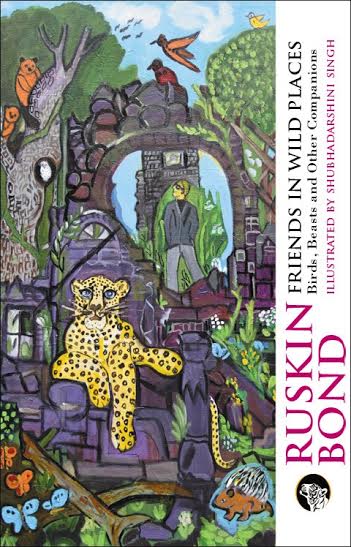
Let me begin the review of Friends in Wild Places by Ruskin Bond (Speaking Tiger Books) by quoting a passage near the end.
Below my cottage was a forest of oak and maple and Himalayan rhododendron. A narrow path twisted its way down through the trees, over an open ridge where red sorrel grew wild, and then down steeply through a tangle of wild raspberries, creeping vines and slender rangal bamboo. At the bottom of the hill, a path led onto a grassy verge surrounded by wild dog roses. The streams ran close by the verge, tumbling over smooth pebbles, over rock worn yellow with age, on its way to the plains and to the little song river and finally to the sacred Ganga.
This is vintage Ruskin Bond, and quite the most delightful read ever. He casts a long look back at the times, the people, the flora and fauna that peopled his adventurous childhood, creatures like a python, elephant, a cassowary bird, Tutu the monkey, Popeye the parrot, Harold the hornbill, a pet turtle or two,Timothy the tiger, and later, a tomcat named Suzy. Those were domesticated animals. Bond also tells us of the wild creatures he has come across, like the leopard in the rail tunnel and on a bleak hilltop, the mongoose and cobra locked in bitter battle, elephants in a less than friendly mood. There is liberal mention of birds, too: blue jays, parakeets, common or garden parrots, mynas, rosy pastors, crested bulbuls, barbets, kingfishers, nightjars.
The anecdotes are liberally sprinkled with humour, as when the author tells us of a pair of baby owls which preferred women to men and tended to snap at anyone in trousers.
To avoid displeasing them Grandfather wore a petticoat at feeding time. This mild form of transvestism appeared to satisfy them. I compromised by wearing an apron. Another evening, another place, he happens to be within hearing range of a large gathering of frogs having something of an Old Boys’ Reunion because everyone seemed to have something to say for himself. The next evening, they seemed to have brought their wives along because the nose sounded like the general conversation of a cocktail party.
He talks of his talent as a plant- whisperer, and how the most sad-looking, wilting plant revives when he take over, and bursts forth in such an array of new leaf an flower that I’m afraid it might pull a muscle or strain a ligament from too much activity. The trees too, are remembered with much warm fondness. The peepal, neem, mango, jackfruit, papaya, the horse chestnut tree, the walnut tree, the deodhar, the palash, the silk cotton tree. As well as the magnificent banyan, which rates a story all its own.
It’s not all joy in the morning, though. Bond tells us of a sinewy, orange-gold leopard he once accidentally came across. The magnificent beast looked at him, then sprang away. A few days later, Bond is in an isolated spot and can distinctly smell a big cat. The author is understandably nervous but the creature remains hidden and lets the human go his way. Yet some more days later, Bond sees it, lifeless, slung on a long bamboo pole hoisted triumphantly aloft by shikaris. “Isn’t he a fine specimen,” they ask him. “Yes,” says Bond quietly. “He was a beautiful leopard.”
It was quite a different time, of course, days of innocence long past. The reader recognizes it as such and heaves a deep sigh of wistfulness. Shubhadarshini Singh`s bright illustrations give a warm touch to the tales. At times, the brief essays take on a Gerald Durrell style of recounting, all gentle humour and a quiet love for nature, mixed with a lively curiosity which thankfully, does not seem jaded now that the author is no longer the tow-headed little boy who loved climbing trees and playing in the mud. Lucky for us that he kept all the notes he took at that time. Read this out to your children. Read it for yourself.
Sheila Kumar is an independent writer and editor, as well as author of a collection of short stories titled Kith and Kin (Rupa Publications).





